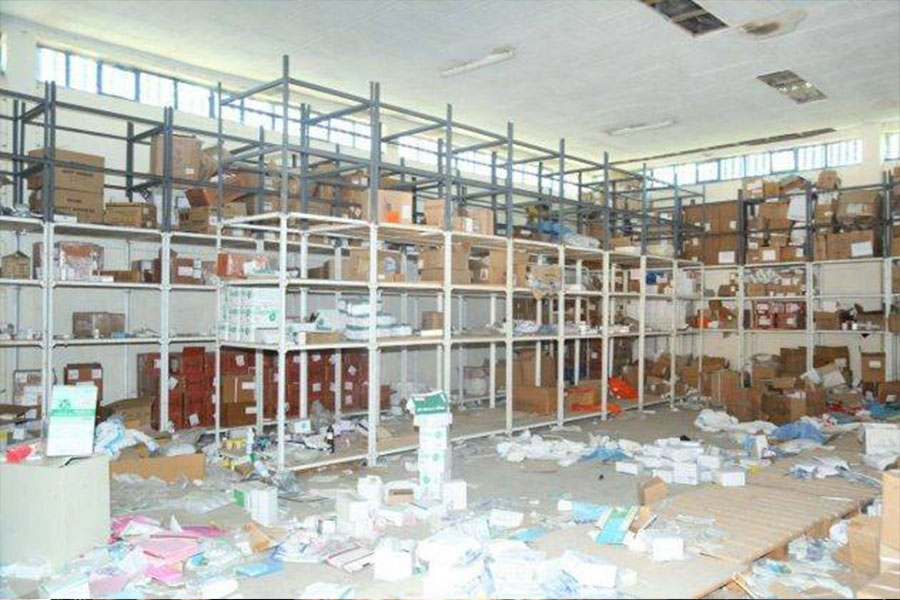
Fortune News | May 29,2021
Feb 12 , 2022
By BERSABEH GEBRE ( FORTUNE STAFF WRITER )
The Addis Abeba Revenues Bureau is to broaden an electronic tax payment system hoping to net additional taxpayer categories this year in a bid to boost revenues.
The Bureau has been implementing an e-filing system beginning last December for around 1,000 'large taxpayers,' classified as businesses having annual turnover above 40 million Br. Almost half of these have already had their profiles filed digitally. Officials plan to include category 'A' and 'B' taxpayers into the system by the end of the year, disclosed Mulegeta Tefera, head of the Bureau.
Businesses with a turnover of between one million Br and 40 million Br are categorised under 'A', and businesses with more than half a million Birr in sales turnover are designated category 'B' taxpayers. The Addis Abeba city administration has classified around 124,000 taxpayers under the two categories. Tax authorities hope the e-filing system will reduce long wait times at the 16 branches the Bureau operates in the city, particularly during tax seasons in October and November. However, the e-filing system remains operational only at the Addis Abeba Large Taxpayers' Branch Office in the Lancia area.
Sesay Sentayew, general manager of GTWOZA Tax & Business Consultancy, looks forward to the changes digitalisation is promised to bring to the "time-consuming" process of filing taxes. According to Sesay, taxpayers are subjected to repeatedly visiting branches to rectify accounting errors.
Electronic filing will allow for more efficient data management, says Mulugeta.
"Files in hard copy could be misplaced or go missing," he said.
Mulugeta pledges the system would ease the process for taxpayers, enabling them to file their taxes online from remote locations.
The Bureau has already introduced an electronic platform dubbed Et-Tax for category 'C' taxpayers (less than half a million Birr in turnover). These were taxpayers required to visit one of the Bureau's branches to learn what they owed in taxes and receive tax notices before paying through a commercial bank. The platform provides them with the information digitally. While the task of compiling taxpayer profiles on a database was hard work, the effort was worthwhile, according to Mulugeta.
“We started with taxpayers under category C," he told Fortune. "They consume the bulk of our time.”
There are 296,000 taxpayers under category C.
The Et-Tax system was developed by Custor Computing Plc, a domestic IT company in software engineering. Last year, the company was awarded a five-year contract worth 14 million Br to develop and maintain the Et-Tax platform. Tax officials say they are already witnessing improvements due to digitalisation. Over the first six-month of the year, the Bureau disclosed it had collected 31.5 billion Br in taxes, nearly a fifth higher than their target and 8.5 billion Br more than the performance from the same period last year. The Bureau targets to collect 48.5 billion Br this year.
“We're hoping revenues collection will improve even more once the system goes fully operational," said Mulugeta.
The city's tax Bureau reached a deal with the Information Network Security Agency (INSA) to upgrade its e-filing system to an e-tax payment system last year. The agreement involves the provision of cybersecurity for the e-filing system and integration with Derash, a national payment platform developed by INSA. Sixteen of the 18 commercial banks have integrated their systems with the platform.
Integration with the Bureau's system will be completed in the next two months, according to Biruk Gebreye, director of Derash Operation Platform at INSA.
Despite the progress, the initiative is not the first of its kind. Ethiopia has rolled out various versions of electronic tax reporting and filing systems since 2009. The former Revenues & Customs Authority introduced an e-filing and e-tax system developed by a local company, TYC Web Design & Development, in 2015. The Ministry of Revenues has also been testing the latest version of an e-tax payment system for the past three years.
“The e-tax payment system introduced by the Ministry has reduced the time it takes to pay taxes," said Sesay. "It helped taxpayers avoid penalties and interest payments resulting from delays in tax filing.”
One of the issues that remain unaddressed by the online tax filing system is the collection of the receipt for taxes paid, which still requires a visit to the tax office.
The Ministry plans to introduce a fully-digitised tax payment system. For almost a year, it has been piloting an e-payment service between the Commercial Bank of Ethiopia (CBE) and nearly a dozen state-owned enterprises to help settle their dues using internet banking. The Bureau is also conducting a study to digitalise the dispatching of its officers, which officials say can help prevent crime.
“The existing system exposes taxpayers to fraud,” said Mulegeta. “Perpetrators harass and take money from taxpayers pretending to be an officer."
PUBLISHED ON
Feb 12,2022 [ VOL
22 , NO
1137]

Fortune News | May 29,2021

View From Arada | Mar 23,2024

Fortune News | Sep 27,2020

Radar | Sep 10,2022

Fortune News | Jun 03,2023

Fortune News | Jun 13,2025

Fortune News | Dec 27,2018

Fortune News | Dec 19,2021

Fortune News | Sep 23,2023

Editorial | Dec 02,2023

Dec 22 , 2024 . By TIZITA SHEWAFERAW
Charged with transforming colossal state-owned enterprises into modern and competitiv...

Aug 18 , 2024 . By AKSAH ITALO
Although predictable Yonas Zerihun's job in the ride-hailing service is not immune to...

Jul 28 , 2024 . By TIZITA SHEWAFERAW
Unhabitual, perhaps too many, Samuel Gebreyohannes, 38, used to occasionally enjoy a couple of beers at breakfast. However, he recently swit...

Jul 13 , 2024 . By AKSAH ITALO
Investors who rely on tractors, trucks, and field vehicles for commuting, transporting commodities, and f...

Oct 25 , 2025
The regulatory machinery is on overdrive. In only two years, no fewer than 35 new pro...

Oct 18 , 2025
The political establishment, notably the ruling party and its top brass, has become p...

Oct 11 , 2025
Ladislas Farago, a roving Associated Press (AP) correspondent, arrived in Ethiopia in...

Oct 4 , 2025
Eyob Tekalegn (PhD) had been in the Governor's chair for only weeks when, on Septembe...